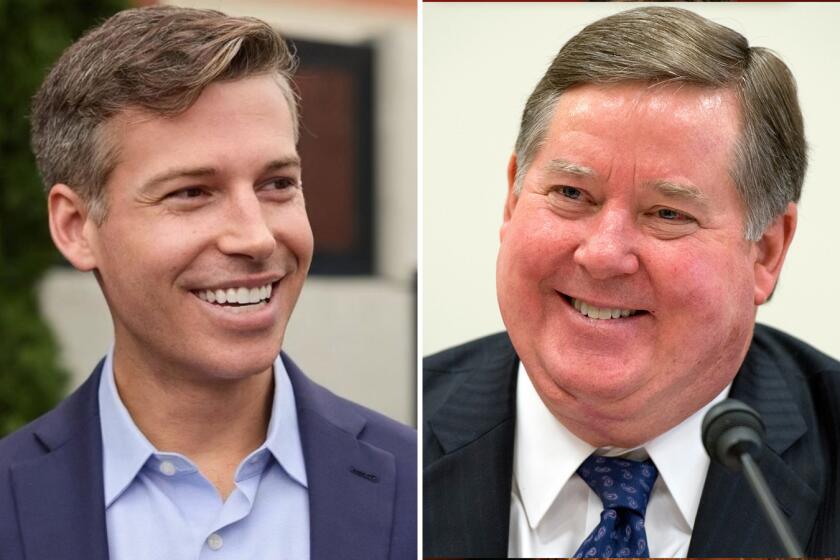Nation looks to California as Republicans and Democrats fight for control of the House

- Share via
The fight for control of the U.S. House of Representatives remained unresolved Wednesday as votes were still being counted in several competitive races in California that could determine whether Democrats or Republicans win the majority.
Golden State voters held unusual power in the national fight this year, with the suburbs of Orange County, the Central Valley’s farm belt and desert communities around Palm Springs and Lancaster playing an outsized role in shaping the next Congress.
See Californian’s latest vote counts for President, Senate and House as well as statewide propositions, State Senate and the Assembly.
“The race for control of the U.S. House remains as close as it’s ever been,” said Erin Covey, the U.S. House editor for the nonpartisan Cook Political Report.
“With several competitive races in West Coast states that take longer to count their ballots, it’s highly possible we won’t know which party has control on election night.”
Going into election day, Republicans were clinging to a razor-thin, four-seat majority in the House and defending 15 seats nationally seen as toss-ups.
No state has more swing seats than California, where six seats are considered highly competitive. Five currently are represented by Republicans and four are in districts President Biden won in 2020.
The outcome of some of the highly competitive races could take days, or even weeks, to resolve. Mail ballots in California can be counted for up to a week after election day as long as they were postmarked by Tuesday.
As the first waves of ballots from Orange County on Tuesday night showed Democrat Derek Tran marginally ahead of Republican incumbent Rep. Michelle Steel in the 45th Congressional District, his supporters smiled at one another — but with the sense that they were settling in for a long night.
Tran said he was “very optimistic,” but alluded to how narrow the margin of victory could be. If needed, he said, his campaign will “make sure every vote is counted” through ballot curing, the painstaking and expensive process of tracking down ballots that were not initially counted because voter signatures did not match state records.
“The path to Democrats winning back the House runs directly through this district,” Tran said.
At Steel’s election night party in Buena Park, the crowd erupted in cheers as Steel took the stage, saying she was confident she would win a third term in Congress.
“Tomorrow morning when we wake up, we’re going to have great news,” she said. “We have so many things to do.”
Dave Min, the Democrat running to assume Rep. Katie Porter’s seat in coastal Orange County, said he was optimistic but nervous as results began to arrive in the 47th Congressional District. Early results showed Min with a healthy lead over Republican Scott Baugh, but the race is expected to be very close.
“The numbers are looking good for us,” Min said, “but you always have butterflies.”
Baugh addressed a loud and rowdy crowd at Muldoon’s Irish Pub in Newport Beach, where attendees wore red “Make America Great Again” hats and snacked on chicken tenders. He credited his campaign team, saying they knocked on more than 400,000 doors on his behalf.
“There’s a red wave coming and we’re very excited,” Baugh said. “We’re going to get the White House and we’re going to make this country great again.”
For Democratic Rep. Adam B. Schiff, who won California’s U.S. Senate race Tuesday, the state’s role in the fight for the House this year was a point of pride.
“California will singularly determine whether we’re the majority or the minority,” Schiff said. “Unless we can win a number of these races, there’s no way we take back the House. If we win all these races, there’s almost no way we fail to take back the House. California is going to decide. That’s pretty exciting.”
The high stakes of the congressional battle brought a rare level of attention to a reliably blue state.
In October, the top House leaders in both parties were in Southern California to campaign on the same day. Two hours and 90 miles apart, House Speaker Mike Johnson (R-La.) appeared with Republican incumbent Rep. Ken Calvert, and Minority Leader Hakeem Jeffries (D-N.Y.) stumped with Democrat George Whitesides in Palmdale.
Their visits came a day after former President Trump held a rally in the Coachella Valley with Calvert, and weeks before former President Clinton stumped with Democratic House candidates in Orange County.
California’s Republican House incumbents campaigned on inflation, crime and U.S.-Mexico border security, painting their opponents as out-of-touch radicals who have caused higher taxes and gas prices. Republicans also sought to tie their challengers to President Biden and California Gov. Gavin Newsom, Democrats whose popularity has sagged.
The presidential race between Democratic Vice President Kamala Harris and Republican former President Trump is at the top of the ticket tonight. Follow our live coverage.
Many Democratic challengers sought to cast Republicans as self-dealing, extreme conservatives who are out of step with their districts. A number of ads focused on abortion, making the claim that California Republicans could, with the help of a GOP-held House, erode access to abortion nationwide.
Nearly $150 million poured into California’s six most competitive districts from outside spenders, including more than $105 million from groups linked to the national Republican and Democratic parties.
Two political newcomers also spent heavily.
A super PAC backed by crypto companies and investors spent nearly $7 million — more than any other industry group — to back Steel and fellow Republican Reps. Mike Garcia, David Valadao and Young Kim. And a super PAC funded by Elon Musk spent more than $4 million on canvassing efforts, digital advertising and text messages to help turn out voters for Calvert, Steel and Valadao.
The largest unaffiliated spender backing Democrats was the League of Conservation Voters, the liberal environmental advocacy group, which spent more than $5 million in five races.
Here are the closest House races to watch across California.
CA-13: Rep. John Duarte vs. Adam Gray
Two years ago, Duarte, a Republican, won this agricultural district by just 564 votes, the second-closest margin in the nation. The race wasn’t called until Dec. 2, nearly a month after the election.
Democrats have a significant voter registration advantage in the district, but the party’s turnout was low in 2022. They’re hoping that higher turnout in a presidential year will swing their fortunes in the Central Valley, where Duarte is facing off again against Democrat Adam Gray, a former state lawmaker from Modesto.
In 2022, GOP Rep. John Duarte beat Adam Gray by just 564 votes. Both men are campaigning hard to win the rematch in a moderate Central Valley district.
CA-22: Rep. David Valadao vs. Rudy Salas
Once a safely ruby-red district, this swath of the San Joaquin Valley is now decidedly purple.
Voters in the district — which includes parts of Bakersfield and portions of Kern, Tulare and Kings counties — favored Biden over Trump by 13 percentage points in 2020, making Valadao one of the most vulnerable GOP incumbents in the country.
Salas, his Democratic opponent, is a former state lawmaker who would become the first Latino elected to Congress from the Central Valley if he wins.
Voters in Congressional District 22 say the hard-fought race between GOP incumbent Rep. David Valadao and his Democratic challenger, Rudy Salas, will come down to the man, not his party.
CA-27: Rep. Mike Garcia vs. George Whitesides
The 27th Congressional district, which covers large swaths of the Antelope Valley, has deep ties to the military and the aerospace industry. Democrats have a 10-point voter registration advantage over Republicans.
The district has been in a political tug-of-war since the blue wave of 2018, when Democrats retook the House and Democrat Katie Hill unseated the district’s Republican incumbent — only to resign less than a year later after a sex scandal.
Garcia won the seat in the special election that followed and has won twice more since then, including by 333 votes in 2020. This year, Garcia is facing Whitesides, a Democrat, former NASA administrator and former chief executive of Virgin Galactic.
CA-41: Rep. Ken Calvert vs. Will Rollins
Calvert (R-Corona), the longest-serving Republican member of California’s congressional delegation, staved off a surprisingly close challenge two years ago from former federal prosecutor Rollins, a Democrat who got almost no support from the Democratic Party. The race was close enough that Rollins attended new member orientation in Washington before California’s late returns showed victory for Calvert.
The district became more competitive after California’s redistricting process swapped reliably red areas of Calvert’s district — including Temecula and Murrieta — for a more liberal swath of the Coachella Valley, including Palm Springs, home to one of the largest concentrations of LGBTQ+ voters in the country.
Rollins, who is gay, became one of the best-funded challengers in the country as he campaigned for a second time to oust Calvert, who has been in Congress since 1993.
In a district that sprawls from the Inland Empire into the Coachella Valley, Democratic challenger Will Rollins is hoping to unseat longtime GOP Rep. Ken Calvert.
CA-45: Rep. Michelle Steel vs. Derek Tran
Steel, a two-term incumbent and powerhouse fundraiser, is facing a challenge from Tran in what has become one of the most explosive, expensive races of 2024.
The 45th Congressional District, home to Little Saigon, has the largest population of people of Vietnamese descent outside of Vietnam, but has never had a Vietnamese American representative in Washington. Tran, born in the U.S. to Vietnamese refugees, is hoping to buck that trend.
Both candidates have fought for older Vietnamese residents who have traditionally supported the Republican Party.
Accusations of “red-baiting” flew after both campaigns attempted to link their opponent to Communist China.
In a tight Orange County congressional race, mailers sent by GOP Rep. Michelle Steel link Democrat Derek Tran to Mao Zedong and socialism, while Tran’s ads say Steel can’t be trusted to “stand up to China”
CA-47: Scott Baugh vs. Dave Min
The 47th District in coastal Orange County has no incumbent candidate because Porter (D-Irvine) ran unsuccessfully for the U.S. Senate rather than seek reelection to the House.
Democrats need to hold the open seat — or win seats elsewhere to make up ground — to claw back the House majority. Republicans see the race as their best opportunity to pick up another seat in California.
Min, a Democrat, is running against Baugh, the former Orange County GOP chair. Baugh narrowly lost to Porter in a bruising and expensive campaign two years ago.
More to Read
Sign up for Essential California
The most important California stories and recommendations in your inbox every morning.
You may occasionally receive promotional content from the Los Angeles Times.



















